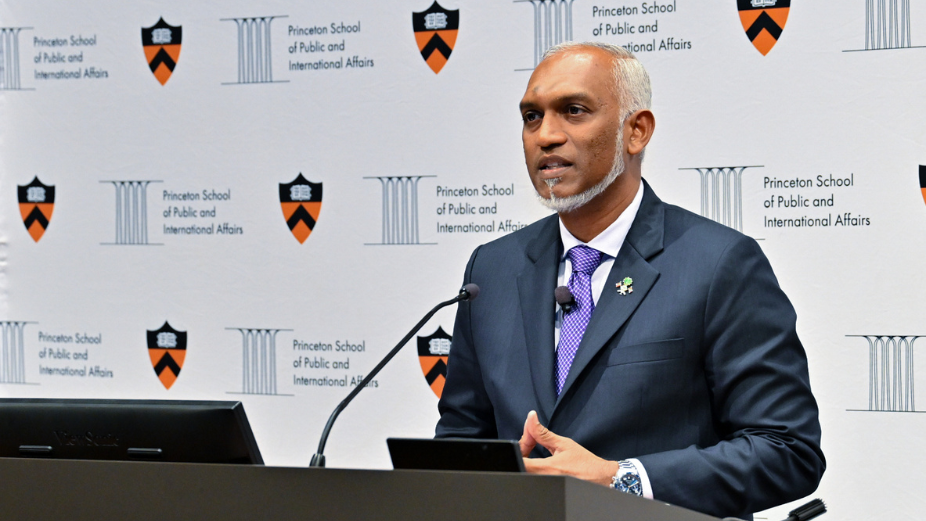
President Dr Muizzu delivered a compelling address at the “Dean’s Leadership Series” at Princeton University on 26th September 2024, emphasising the Maldives’ vital role in upholding the rule-based international order in the Indian Ocean. Speaking to an audience of academics and students, President Muizzu outlined the strategic importance of the Maldives in global trade and energy security, highlighting its pivotal location along crucial sea lines of communication.
In his speech, President Muizzu noted that the Maldives occupies a significant position in the Indian Ocean, through which one-third of global bulk cargo traffic and over half of the world’s daily oil consumption pass. He stressed that the strategic location of the Maldives makes it a key player in the balance of power in the region, adding that “anyone who would like to have a say, and sway the balance of power in the Indian Ocean, would find the Maldives an attractive place to influence.”
The President also reaffirmed his commitment to strengthening the sovereignty and independence of the Maldives, noting that he had pledged to uphold these values during his presidential campaign. He highlighted the importance of a rule-based order in the Indian Ocean and the Maldives’ role in ensuring its stability, stating that the country would continue to contribute to multilateral efforts to safeguard international norms.
President Muizzu’s address covered a range of key issues, including the Maldives’ leadership in climate action and sustainable development. He revealed that the country is on track to generate 33 percent of its electricity through renewable energy by 2028 and is investing in smart, climate-friendly urban centres, including the development of Ras Malé, an eco-city designed to drive innovation and sustainability.
He also emphasised the need for economic diversification, with the Maldives aiming to attract more foreign investment and expand its revenue sources. The country has passed a new Foreign Investment Act, and the expansion of Velana International Airport is being accelerated to support the growing tourism sector, which remains a cornerstone of the economy.
Reflecting on the Maldives’ transition to democracy, President Muizzu acknowledged that the country is still a young democracy, with just sixteen years of multi-party governance. He reaffirmed his administration’s commitment to strengthening democratic institutions and combating corruption, with the support of international partners like the United States.
In closing, President Muizzu reiterated the importance of a strong and independent Maldives in the broader context of Indian Ocean security and global trade, stating, “A prosperous, strong, and fiercely independent Maldives is important to us all, and everyone.”
His address was well received at Princeton University, with attendees noting the President’s clear vision for the future of the Maldives and its vital role on the world stage.











